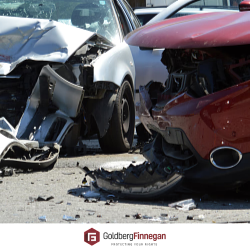Car Accident Lawyers in Silver Spring, Maryland Fighting for the Rights of Accident Victims
More Than $150 Million Recovered For Injury Victims
Dealing with a car accident caused by another driver in Silver Spring, College Park, or another nearby Maryland community? Involved in a head-on collision on Franklin Avenue due to a distracted driver? Or maybe you were hurt in a rear-end accident on I-495 caused by a speeding driver?
Whatever the circumstances of your Maryland car crash, you need to act fast for your health and your rights. Our Silver Spring car accident lawyers know because we’ve been helping injury victims rebuild their lives in Montgomery County, Prince George’s County, and other nearby communities.

If you have been injured in an auto accident, it’s important to understand what legal protections you have. The long-term and short-term effects of an auto injury can change your life forever. You may suffer from physical impairments that prevent you from returning to work for months or even years, you may experience severe emotional trauma, and find yourself in extreme financial distress because you cannot return to work for an extended period of time.
 If you have been injured in a car accident, you may be able to seek compensation for your pain and suffering. In these cases, pursuing compensation through an automobile accident claim is often the best way to ensure that the at-fault party helps bear financial responsibility for your pain and suffering. Reach out to Goldberg Finnegan as soon as possible and schedule a free consultation today. Our Maryland car accident attorneys can help you rebuild your life for a stronger future.
If you have been injured in a car accident, you may be able to seek compensation for your pain and suffering. In these cases, pursuing compensation through an automobile accident claim is often the best way to ensure that the at-fault party helps bear financial responsibility for your pain and suffering. Reach out to Goldberg Finnegan as soon as possible and schedule a free consultation today. Our Maryland car accident attorneys can help you rebuild your life for a stronger future.
Maryland car accidents by the numbers
- Every 17 minutes and 45 seconds – Car accident injury occurs in Maryland
- 1 hour and 46 minutes – Distracted driving injury occurs
- 3 hours and 29 minutes – Speeding car accident injury occurs
- 4 hours and 33 minutes – Drunk driving injury occurs
- 517 car accident fatalities each year on average in Maryland
Source: Maryland Department of Transportation
What should I do after a Maryland car accident?
Injured in a car accident in Silver Spring or another city in Maryland caused by another driver? It’s important that you take certain steps right away. But knowing what to do after a car accident can be confusing.
In general, you should take the following steps right away:
- Call the police and tell them you have been injured in an accident. If you’re not sure who to call, simply dial 911 and ask the dispatcher to send a police officer to your crash site.
- Ask the dispatcher to send an ambulance if you or anyone else appears seriously injured. Don’t take chances with your health.
- Stay at the scene of your accident. Leaving the scene of a car accident in Maryland is against the law, even if no one was injured, according to Maryland Code, Public Safety 13A-1039.
- If it’s safe to do so, get the other driver’s information, including their name, address, phone number, driver’s license number and insurance information.
- If you are healthy enough to do so, take photos of your crash site. The more pictures, the better.
- If someone saw your accident, get their name and phone number. Statements from eyewitnesses can be powerful pieces of evidence in support of your car accident injury claim or lawsuit.
- Do not talk about your accident with anyone, including with witnesses or the other driver. Anything you say about your crash could later be used to reduce or perhaps even deny your accident claim.
- Call your insurance company and tell them you have been in a car crash caused by another driver. Keep your comments brief. You can discuss your accident in more detail later.
- Don’t talk to the other driver’s insurance company if they contact you. Even if they seem polite, the at-fault driver’s insurance company is likely simply looking for anything they can use to reduce or deny your accident claim.
- See a doctor right away after your accident. Even if you feel fine, you could have a serious injury (such as a concussion or whiplash) and not even realize it.
- Contact a Silver Spring car accident lawyer as soon as possible to learn more about your legal rights.
What are the common causes of auto accidents?
 An auto accident can be the result of a number of factors including, but not limited to, distracted driving, drunk driving, speeding, running stop signs and red lights, and adverse road conditions.
An auto accident can be the result of a number of factors including, but not limited to, distracted driving, drunk driving, speeding, running stop signs and red lights, and adverse road conditions.
If you have suffered injuries in an automobile accident, you should consider seeking legal help to get the justice you deserve. While no amount of money will ever be able to restore the life you enjoyed prior to your accident, compensation might assist you in paying for costs not covered by your insurance along with expensive medical bills that you may experience as a result of your injuries.
"Very professional and caring. My attorney was caring, very professional and very intelligent person who prepared me for the long haul with regards to the settlement of the car accident I was involved in. I can also say the same about my attorney’s legal assistant. I highly recommend Goldberg and Finnegan, and am highly satisfied with the outcome of my settlement!!"
- T.A.
How can I recover compensation in a car accident case?
If you are injured in a car accident due to the other driver’s negligent actions, you may be entitled to financial compensation. Typically, compensation is awarded based on economic losses and non-economic losses:
- Economic Losses: This type of loss includes hospital bills, past, and future medical expenses, rehabilitation services, loss of income, and loss of earning capacity for future wages.
- Non-economic Losses: This includes pain and suffering (past and future), emotional distress (past and future), physical impairment (past and future) and loss of enjoyment of life.
You need an experienced car accident attorney to help you determine the amount of financial compensation you may be able to recover based on the facts of your case and the ability to prove the extent of your injuries. We can help direct you through the process to make the most out of your car accident injury claim.
We can also explain how Maryland’s car accident compensation system works, especially when it comes to pure contributory negligence. This system can be confusing, and our legal team can help you navigate your way through this legal process.
How much is my car accident worth?
There’s no set dollar amount when it comes to car accidents. The bottom line is you should be financially compensated for all your accident-related expenses. That’s because Maryland is an at-fault car insurance state. This means the at-fault party (often the at-fault driver’s insurance company) must pay for your accident. Such expenses can include:
- Cost of all medical care, including emergency medical treatments, surgery, and follow-up medical care.
- Vehicle repairs or the cost of buying a new car if it’s a total loss.
- Replacement income if you need time off from work to rest and recover from your injury.
- Lost income if you cannot return to work or can only work in a reduced capacity due to a permanent disability sustained in your accident.
- Pain and suffering in certain circumstances.
Notable car accident case results obtained by our law firm
- $4.975 Million Car Accident Wrongful Death Result
- $1.75 Million Car Accident Settlement
- $1.5 Million Car Accident Verdict
Legal options available after my car accident
Depending on the circumstances of your Maryland car accident, you often have several options available for obtaining the financial compensation you deserve for your accident-related expenses:
- Accept a settlement offer from the at-fault driver’s car insurance company.
- Ask for more money and negotiate a better settlement offer.
- File a car accident lawsuit seeking damages, the legal term for financial compensation.
If you do decide to file a lawsuit, keep in mind that you have only three (3) years to do so from the date of your accident in Maryland. This is due to the state’s statute of limitations deadline for taking legal action.
Whichever route you decide to pursue, an experienced lawyer can help you navigate your way through Maryland’s complex legal system. That way, you can give your car accident injury claim or lawsuit the best chance for success.
Why should I hire a Maryland car accident attorney?
Often, the at-fault driver’s insurance company will try to reach a settlement for substantially less money than your claim is worth. Many car accident victims do not realize the extent of their legal rights when they have sustained serious injuries. The fact is that you may be entitled to fair compensation for injuries sustained due to a negligent driver.
If you want the best chance of receiving maximum compensation for medical bills, lost wages, and more, contact Goldberg Finnegan immediately and schedule a free case evaluation. We can guide you through this complex legal process. The first step toward getting justice is hiring a Goldberg Finnegan personal injury lawyer with experience handling auto accident cases similar to yours.
Can a local lawyer in Silver Spring, Maryland handle my case?
The lawyers at Goldberg Finnegan have been protecting the rights of those involved in car accident cases in Silver Spring for years. No amount of money can ever bring back the state of health and life you led prior to your car accident.
However, we also believe that our clients deserve a fair settlement for their medical bills, pain and suffering, lost wages, and other damages caused by another driver. If you have sustained injuries in an automobile accident, reach out to Goldberg Finnegan as soon as possible and schedule a free consultation today.
The clock is running. Contact us right now. One of our Maryland car accident lawyers can meet with you and explain all your legal options. Our law firm handles car accident injury claims and lawsuits in Montgomery County, Prince George’s County, Howard County, Frederick County, Charles County, and other nearby communities.
